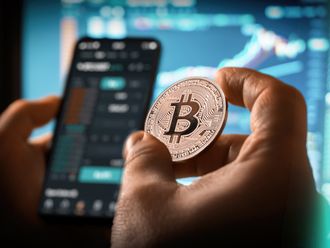Gold hit another record around $1,394 an ounce on Friday before speculators cashed in, but a falling dollar blamed on the US Federal Reserve's unpopular decision to buy more government bonds could still spur buying. Investors await the release of monthly US jobs report, which may show anaemic jobs growth in October. The Fed's move was a little more than expected, but not enough to spook markets with worries about a worse-than-anticipated US economic picture.
US dollar
The US dollar paused near fresh lows on Friday after breaking down to a new 2010 trough against a basket of currencies, but investor appetite for risk was expected to continue and grind the low-yielding greenback down. The dollar index hit an 11-month low on Thursday in the aftermath of a decision by the Federal Reserve to buy government bonds, opening the way for a possible test of its 2009 low of 74.17. It edged up on Friday but still looked vulnerable. Policymakers from the world's new economic powerhouses in Asia criticised the Fed's move to inject billions of dollars into the US economy, saying it made any substantive deal on cutting global economic imbalances less likely at next week's Group of 20 meeting in Seoul.
Euro
The euro continued to trade around $1.4200 after soaring as far as $1.4283, its strongest since late January. The Fed's commitment this week to open-ended purchases of Treasuries, implying low funding costs, has renewed the focus on the dollar as a funding currency for purchases in commodities, emerging markets and higher-yielding currencies. Highlighting the risk-on sentiment that has characterized markets' reaction to the Fed's plan to pump in more money, share markets around Asia rose on Friday, while gold hit a record high and palladium a nine-year high.
Yen
The Bank of Japan concluded a policy review without easing policy further after the Fed's decision and the yen firmed slightly after the announcement on slight disappointment there was no expansion to its asset buying plan in response to the Fed. Analysts expect some weakening in Japan's economic indicators ahead and some say more easing through asset-buying will be needed.
Sterling
Sterling jumped to a nine-month high against an under-pressure dollar and gained versus the euro on Thursday, buoyed by a Bank of England decision to keep rates unchanged and its asset-purchasing programme on hold. The central bank's decision to shun quantitative easing contrasted with an announcement by the US Federal Reserve on Wednesday to buy a further $600 billion in government bonds to stimulate economic growth, which sent the dollar tumbling across the board. Sterling's gains following the BoE announcement suggested the market had priced in a small risk of the BoE opting for another round of quantitative easing (QE) after one policymaker, Adam Posen, voted for more QE last month.
Oil
Oil rose to a two-year high on Friday, recovering almost half the territory lost from a mid-2008 record to the low at the deepest point of the recession. A new round of economic stimulus in the US is boosting the appeal of commodities to preserve value in an environment of dollar depreciation, while a sluggish but sustained economic recovery in industrialized economies and rampant growth in emerging Asia are raising demand for energy and raw materials. Global oil demand next year could bounce back to levels last seen in 2007 as recovery from the deepest recession in decades drives fuel use, but the Organization of the Petroleum Exporting Countries (Opec) does not plan to add extra capacity as more non-Opec supply curbs the need. An oil price of $90 a barrel would not hold back the world economy, Opec's secretary general said on Thursday, a higher level than previously identified as posing no risk to growth.
Source: Richcomm Global Services, DMCC, Dubai; www.richcommglobal.com
|
Price Update
|
|
|
GOLD
|
1388.2
|
|
SILVER
|
26.45
|
|
EURO
|
1.4204
|
|
GBP
|
1.6231
|
|
YEN
|
80.75
|
|
RUPEE
|
43.88
|
|
AED / INR
|
11.947
|
|
AUD
|
1.0148
|
|
CHF
|
0.9571
|
|
CAD
|
1.0021
|
|
OIL - WTI)
|
87.19
|
|
|
|
|
Date
|
November 5, 2010
|
|
Time
|
10:42:00 AM
|











